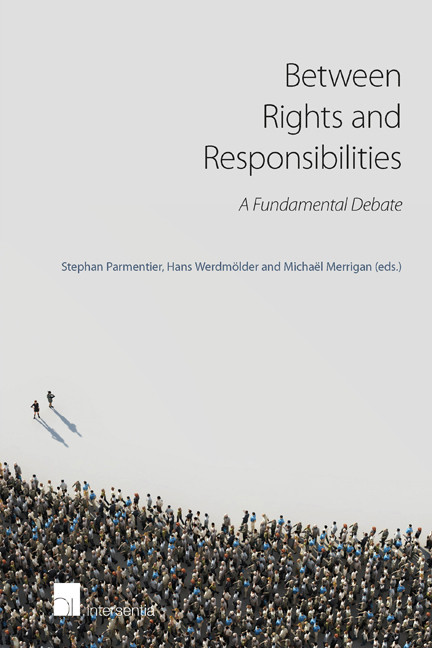Book contents
- Frontmatter
- Foreword
- Contents
- About the Authors
- Introduction: Towards an Integrated Vision of Rights and Responsibilities
- PART I FUNDAMENTAL RIGHTS AND FUNDAMENTAL RESPONSIBILITIES: SETTING THE SCENE
- PART II RIGHTS AND RESPONSIBILITIES IN SPECIFIC CONTEXTS
- Human Rights in a Globalising Economy. Is the Right to Social Protection Qualified by a Duty to Work?
- Human Rights in a Globalising Economy. Rights and Responsibilities of Trade Unions
- Fundamental Rights and Responsibilities within a Multicultural Society
- From Lawless to a Human Rights Approach in the Fight Against Terrorism. The Council of Europe Standards
- Children's Rights at a Dignitarian Horizon of Responsible Parenthood
- Individuals’ Duties in the African Human Rights Protection System. Challenges and Prospects
- Declaration of Human Duties and Responsibilities
From Lawless to a Human Rights Approach in the Fight Against Terrorism. The Council of Europe Standards
from PART II - RIGHTS AND RESPONSIBILITIES IN SPECIFIC CONTEXTS
Published online by Cambridge University Press: 22 November 2017
- Frontmatter
- Foreword
- Contents
- About the Authors
- Introduction: Towards an Integrated Vision of Rights and Responsibilities
- PART I FUNDAMENTAL RIGHTS AND FUNDAMENTAL RESPONSIBILITIES: SETTING THE SCENE
- PART II RIGHTS AND RESPONSIBILITIES IN SPECIFIC CONTEXTS
- Human Rights in a Globalising Economy. Is the Right to Social Protection Qualified by a Duty to Work?
- Human Rights in a Globalising Economy. Rights and Responsibilities of Trade Unions
- Fundamental Rights and Responsibilities within a Multicultural Society
- From Lawless to a Human Rights Approach in the Fight Against Terrorism. The Council of Europe Standards
- Children's Rights at a Dignitarian Horizon of Responsible Parenthood
- Individuals’ Duties in the African Human Rights Protection System. Challenges and Prospects
- Declaration of Human Duties and Responsibilities
Summary
‘Against the call for so-called “tough measures”, few political leaders can find the strength and wisdom or indeed the support to fight terrorism while preserving the established human rights protective system. Repressive sirens will always call for “new” harsh measures to meet these “new” challenges from terrorism and few leaders have the toughness to “hold the fort” in such circumstances.’
ECtHR Judge John HediganINTRODUCTION
The fight against terrorism is high on the domestic and international political agenda. Over the past years, various governments in Europe (and elsewhere) have approved numerous laws to amend domestic law in order to fight the so-called ‘War on Terror’ more effectively. This contribution looks at this security legislation from a human rights perspective, focussing on the applicable standards developed within the framework of the Council of Europe in which the case law of the European Court of Human Rights (ECHR) plays a prominent role. In doing so, this chapter aims to identify certain trends. Its aim is not to present an exhaustive overview of all relevant case law of the ECHR.
When examining the standards developed within the framework of the Council of Europe, the dual responsibility for national authorities emerges. On the one hand, one may expect a state to uphold fundamental rights of terrorist suspects. On the other hand, states have the responsibility (also from a human rights perspective) to offer protection to their citizens. By way of introduction the ‘Gibraltar judgment’ of the ECHR is discussed (section 2), after which some more general comments are made concerning terrorism being a ‘new’ threat (section 3) and the clash between the responsibility to uphold civil liberties and the duty to protect (section 4). Attention then shifts to the need for proper procedural guarantees (section 5). Two specific issues in this regard are highlighted: the problematic use of information from intelligence agencies in judicial proceedings (section 6) and the tendency of domestic legislators to create a separate legal space for terrorism (section 7).
THE GIBRALTAR CASE
‘The shooting took place on a fine Sunday afternoon’ could be the opening sentence of an Ernest Hemingway novel, but is in fact to be found in the McCann judgment of the European Court of Human Rights.
- Type
- Chapter
- Information
- Between Rights and ResponsibilitiesA Fundamental Debate, pp. 141 - 156Publisher: IntersentiaPrint publication year: 2016



